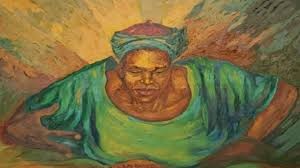Ahebi Ugbabe: The Only Female King of Colonial Nigeria and Her Unprecedented Reign

Ahebi Ugbabe: The Only Female King of Colonial Nigeria and Her Unprecedented Reign
Discover the remarkable story of Ahebi Ugbabe, the only female king in colonial Nigeria, whose unprecedented reign challenged gender roles and colonial norms.
History is filled with powerful rulers, but few have challenged societal norms as boldly as Ahebi Ugbabe, the only female king in colonial Nigeria. Rising from exile and hardship, she defied gender roles, collaborated with colonial authorities, and redefined leadership in Igbo society. Her story is one of ambition, resilience, and ultimate defiance of tradition.
Early Life and Exile
Ahebi Ugbabe was born around 1880 in Umuida, Enugu-Ezike, present-day Enugu State. Her father, Ugbabe Ayibi, was a palm wine tapper and farmer, while her mother, Anekwu Ameh, engaged in farming and trading. Their life took a tragic turn when a diviner proclaimed that the family’s misfortunes were due to an offense against Ohe, the goddess, and that the only way to appease her was for Ahebi to be married to the deity.
Refusing to accept this fate, Ahebi fled to Igala territory, where she took control of her destiny. As a young girl in an unfamiliar land, she turned to sex work, which, instead of diminishing her, became a tool for her survival and social advancement. She learned multiple languages, including Igala, Nupe, and Pidgin English, skills that would later serve her well.
Return to Enugu-Ezike and Rise to Power
With her business acumen and connections to influential leaders, including the Attah (king) of Igala and British colonial officers, Ahebi facilitated British entry into Enugu-Ezike. As a reward for her assistance, the British installed her as a warrant chief in 1918—the only woman to hold such a position in colonial Nigeria.
Her appointment was met with fierce opposition from male chiefs, but her ability to communicate with the colonialists and her role in suppressing local resistance solidified her power. She gradually alienated traditional leaders and consolidated control, eventually declaring herself Eze (king), rather than Eze Nwanyi (queen), further defying gender roles.
A King Like No Other
To legitimize her rule, Ahebi sought coronation from the Attah of Igala, a people more accepting of female rulers. Her return to Enugu-Ezike as Eze marked the peak of her power. She established her own court, imposed taxes, and ruled with an authority that rivaled male rulers before her.
She also challenged gender norms in her personal life. She took multiple wives, arranged marriages for her brothers, and claimed paternal rights over the children born into her household. Ahebi blurred the lines between male and female roles, embodying the authority traditionally reserved for men.
The Downfall of Ahebi Ugbabe
Ahebi's unrelenting pursuit of power eventually led to her downfall. Her introduction of a personal masquerade, Ekpe Ahebi, was the final straw. In Igbo tradition, masquerades were strictly male domains, representing ancestral spirits. Her attempt to control one was seen as the ultimate desecration of sacred customs.
The elders of Enugu-Ezike took her to court, and in a surprising betrayal, the British sided against her. Stripped of her influence, Ahebi's reign declined, and she was forced to retreat from public life. However, she remained Eze until her death in 1948.
Legacy and Impact
Before her death, Ahebi anticipated that her people might deny her a proper burial, so she performed her own funeral rites in 1946. Despite her controversial reign, she was buried according to male royal traditions. Today, she is remembered in songs, parables, and folklore, and she is even worshipped as a goddess in parts of Enugu-Ezike.
Ahebi Ugbabe’s story challenges traditional narratives of leadership and gender roles in African history. Her ability to maneuver through patriarchal and colonial systems to carve out power for herself remains an extraordinary feat. Though she was ultimately overthrown, her legacy as Nigeria’s only female king endures as a testament to defiance, ambition, and the complex intersections of gender and power.
Conclusion
Ahebi Ugbabe’s reign serves as a compelling chapter in Nigerian history, one that highlights the complexities of colonialism, gender politics, and indigenous governance. Her life story remains an inspiration for those who dare to challenge the status quo, proving that resilience and determination can break even the most entrenched societal barriers.


